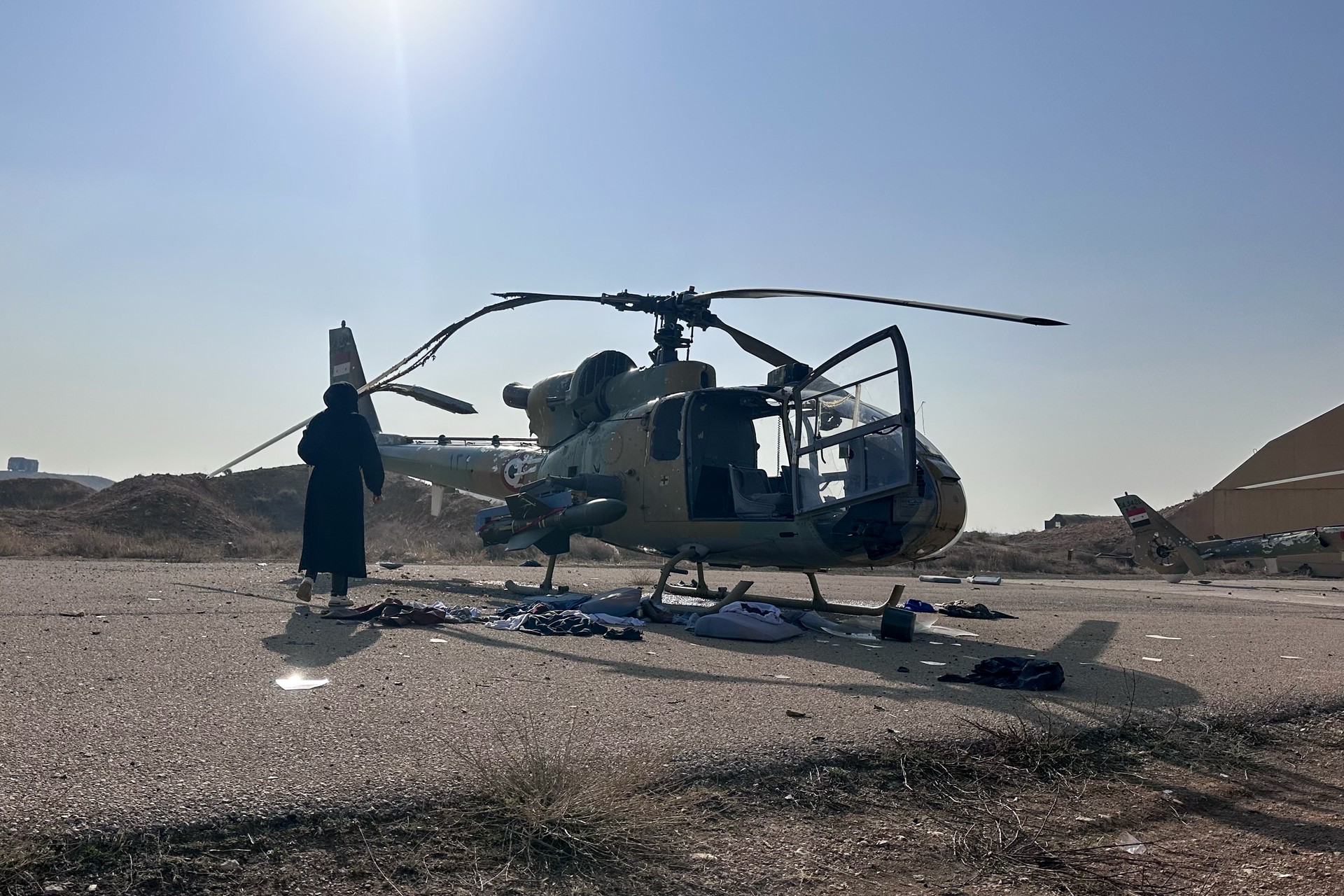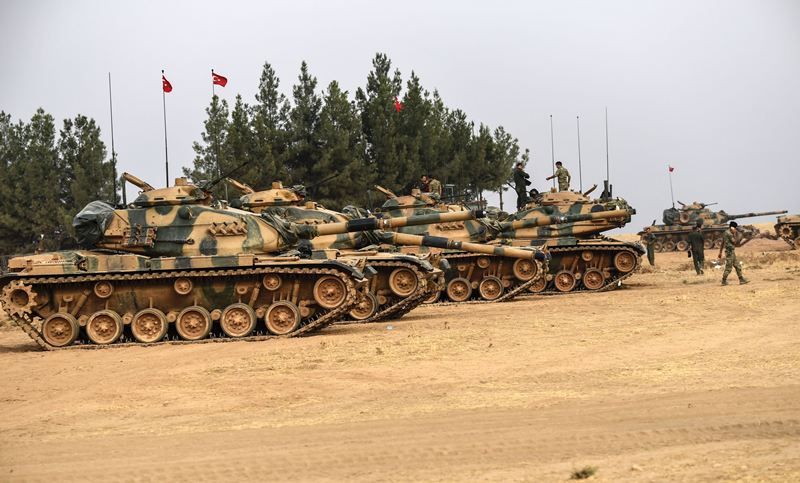
As the United States begins withdrawing hundreds of troops from Syria, the strategic face of the Levant continues to change.
Among the developments drawing attention is Türkiye’s anticipated deployment to the T-4 Air Base, a move some commentators compare to Russia’s earlier intervention via Hmeimim. This analogy, however, collapses under closer inspection, as it's crucial to understand what's different about today's Syria from last year.
While there may be surface-level similarities, such as the use of air bases, formal invitations from Damascus, counter-Daesh justifications, and assumptions about Israel's operational freedom—the strategic rationale and operational posture behind Türkiye’s engagement diverge sharply from those of Russia and Iran.
Huseyin Bagci, president of the Foreign Policy Institute and a professor at METU, notes that the relationship between Israel and Türkiye over Syria will inevitably shape the country’s future, for better or worse. In this context, allowing Israel to carry out airstrikes at will within Syria is not an approach Türkiye is likely to tolerate, which would mark a key point of departure from Russia’s stance.
Given this divergence, the structure and systematization of Türkiye’s planned bases in Syria are also expected to differ markedly. According to Turkish analyst Diren Dogan, any prospective Turkish military outposts are unlikely to mirror Russia’s heavily fortified installations, which are typically backed by advanced air defense systems like the Pantsir or S-400. Instead, they are expected to be equipped with deterrent assets centered around drone warfare and offensive capabilities.
As Dogan notes, the objective extends beyond simply safeguarding Turkish troops on the ground—it is also aimed at supporting Syria’s territorial integrity in a broader, stabilizing role.
Footage from the Israeli airstrikes targeting Syria's T-4 and nearby Palmyra bases on March 21–22, 2025. (Video via Israeli army)
A key difference between the two countries' actions in Syria is their relationship with Damascus. Russia's military presence has primarily focused on supporting Assad's regime, prioritizing its strategic foothold in Syria to ensure the regime's survival at all costs.
In contrast, Türkiye’s involvement in Syria is not about defending an administration or government. Rather, Ankara seeks to negotiate influence in Syria through engagements with various factions and local actors. Türkiye’s goal is to secure its borders, prevent the establishment of a terrorism stronghold of any type, and combat instability, particularly the Daesh terrorist group and the SDF, a group that is mostly dominated by the PKK terrorist group's Syria offshoot, YPG.
Türkiye’s approach is about securing its national interests and establishing a stable environment in the region, rather than fully aligning with or protecting Syria's new administration, nor does it have such a hierarchy.
Sinan Ulgen, director of the Istanbul-based think tank EDAM and senior fellow at Carnegie Europe, highlighted the fundamental differences between Türkiye’s engagement in Syria and Russia’s involvement. "From the standpoint of Türkiye's political and military engagement in Syria, there are a number of fundamental differences."
Ulgen emphasized that Türkiye’s political objective is centered on helping the new Syrian regime rebuild the country and establish key state structures, such as law enforcement and national security.
This is in stark contrast to Russia’s approach, which the expert argued was mainly about supporting the former regime’s warfighting mission without a broader effort to enhance the state’s capabilities.
Speaking to Türkiye Today, Huseyin Bagci emphasized that any Turkish presence would be fundamentally cooperative: “If the Syrian government formally requests it, Türkiye could respond accordingly. The scope of this cooperation might include border security and counterterrorism efforts.”
He added that, unlike previous actors in Syria who acted unilaterally, Türkiye is operating with a clear preference for legitimacy and structured partnership.
Meanwhile, Ulgen also compared the political goals of both countries in Syria, focusing on the sectarian issues that have complicated the conflict. Russia’s strategy, he explained, was rooted in supporting a minority regime and even resorted to extreme actions, including war crimes, to protect its proxy government in Damascus.
"Türkiye is actually doing the exact opposite by trying to compel the new Syrian government to be inclusive and not sectarian," Ulgen explained. He believes that this approach is critical for the long-term political stability of Syria, marking a significant contrast to Russia’s divisive strategy.

Geopolitical proximity plays a crucial role in understanding the nature of Türkiye’s military deployment. Unlike Russia, which had to intervene in a foreign country thousands of miles from its borders, Türkiye shares a direct border with Syria and faces solid and direct threats. This proximity logistically makes this less of a foreign intervention and more of a regional security extension.
The T-4 airbase, which is located in Syria, is only a few hours’ drive from Türkiye’s southern border, giving Türkiye a significant logistical advantage. Türkiye’s military objectives are rooted in its immediate national security concerns, while Russia’s involvement in Syria was more focused on global strategic influence.
When comparing Türkiye’s military deployment to Russia’s intervention, it is essential to recognize the difference in the scale of geopolitical impact. Russia’s involvement in Syria was part of a broader strategy to assert itself as a global power, reshaping the Middle East and challenging Western influence in the region. Russia’s military campaign had far-reaching consequences, with global ramifications for security and diplomacy.
In contrast, Türkiye’s involvement in Syria is primarily regional in nature. While the deployment will certainly have an impact on regional dynamics, it does not carry the same global significance as Russia’s intervention. The scope of Türkiye’s military action is, therefore, more limited, with a focus on regional stability rather than having another item on the bargaining table.
Both Russia and Türkiye have used the threat of Daesh as a justification for their military actions in Syria, but the realities behind their rhetoric are vastly different. Russia’s anti-Daesh rhetoric has often been known as a cover for its broader goal of targeting Assad’s opposition, including moderate rebel groups that posed a threat to the Assad regime.
Türkiye, on the other hand, has a long track record of actively fighting the Daesh terrorist group. Türkiye has been one of the leading regional powers in the battle against the terrorist group, conducting multiple military operations against it in Syria and Iraq, eliminating many high-ranking so-called leaders of the terror group.
For Türkiye, the fight against Daesh is not a secondary justification for intervention but a central pillar of its security strategy, aimed at protecting its borders and citizens from terrorism, a threat it has experienced firsthand with significant losses.
Ankara also works closely with regional partners to dismantle the group’s presence and influence on the ground.

When comparing the military footprints of Russia and Türkiye, the scale and objectives of their respective deployments are worlds apart. Russia’s intervention in Syria involved a large-scale aerial campaign, with extensive use of airstrikes, artillery, and ground forces to achieve its objectives.
The operation was expansive, to reshape the power dynamics inSyriaand maintain Russian influence in the Middle East, and cities were sacrificed and devastated completely for this purpose.
Türkiye’s military deployment, in contrast, is essentially different in its scale and much more well-defined. Türkiye is not planning a full-scale invasion of Syria, but rather a targeted operation to address specific security concerns, if any issue remains unsolved with negotiations.
EDAM’s director Ulgen, further explained that Russia’s extreme measures, including military actions that harmed civilians, resulted in a large-scale humanitarian disaster. "Russia, alongside the Syrian Arab Army, has actually used its military might on civilians," he stated, adding that Russia’s military presence effectively acted in place of the Syrian Army in some instances.
In contrast, Türkiye’s strategy is different in both intent and execution. He made it clear that Türkiye will not be involved in fighting the Syrian opposition in place of the Syrian government, a significant departure from Russia’s military strategy.
All in all, while Türkiye’s planned military deployment in Syria may resemble Russia’s intervention on the surface, the underlying differences in objectives, strategy, and execution are substantial.
Rather than a replication, it reflects a structural recalibration, one that could be read as "lessons learned from Russia and Iran’s Syria intervention" or a broader indication of "how much the landscape in Syria has changed."